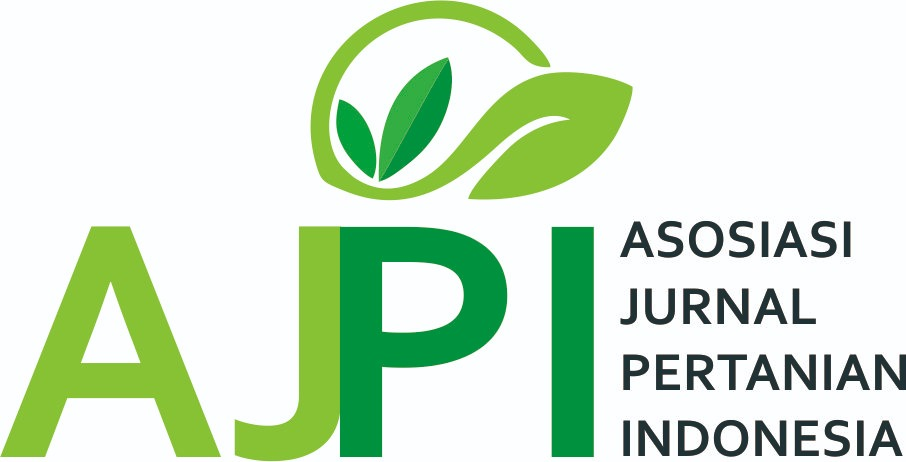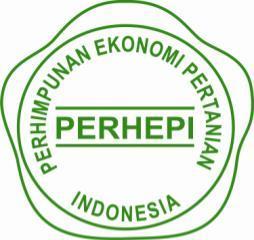Perceptions of Agricultural Commodity Traders on the Effectiveness of the Traditional Market Revitalization Program in Bengkulu City
Abstract
Revitalization is an alternative path that must be taken by traditional markets in order to compete in the globalization era. The role of traditional markets will continue to be degraded and reduced if adequate facilities are not immediately repaired. This is due to the increasing number of modern markets emerging so that with the revitalization, it is expected that traditional markets can compete with modern markets. This study aims to analyze the effectiveness of the traditional market revitalization program in Bengkulu City and its relationship to revenue, number of consumers, working hours, and user fees. This research was conducted intentionally with the purposive sampling method. Respondents in the study amounted to 55 people spread over three traditional markets in Bengkulu City, namely Panorama Market, Minggu Market, and Barukoto Market. The results of the study show that the overall revitalization program for traditional markets in Bengkulu City is quite effective. Based on correlation analysis, variable acceptance, number of consumers, and working hours have a positive correlation to the effectiveness of the traditional market revitalization program in Bengkulu City. Meanwhile, another variable, namely user fees, has no correlation with the effectiveness of the traditional market revitalization program in Bengkulu City.
Downloads
References
Andriani, M. N., dan M. M Ali. 2013. Kajian Eksistensi Pasar Tradisional Kota Surakarta.Jurnal Teknik PWK 2 (2) : 252-269
Aprilia, R. 2017. Dampak Revitalisasi Pasar Tradisional terhadap Pendapatan Pedagang di Pasar Bulu Semarang. Economics Development Analysis Journal. 6 (2) : 215-221.
Arimbawa, I.G.N.A.A & A.A.I.N Marheni. 2017. Analisis Efektivitas Program Revitalisasi Pasar Tradisional di Pasar Desa Adat Intaran Sanur. PIRAMIDA Jurnal Kependudukan dan Pengembangan Sumber Daya Manusia .XIII(1) : 18-26.
Cahyani, N. M., Suamba, I. K., & Dewi, I. A. L. 2022. Tata Kelola Pasar Tradisional dan Pendapatan Pedagang setelah Adanya Revitalisasi Pasar (Studi Kasus Pasar Kapal Kecamatan Mengwi Kabupaten Badung). Jurnal Agribisnis dan Agrowisata. ISSN2685 3809.
Djuniadi, A. M., dan W. Lestari. 2017. Statistik Inferensial Teori, Aplikasi dan Latihan Soal dengan SPSS. Semarang: Pascasarjana Universitas Negeri Semarang.
Kementerian Perdagangan Republik Indonesia. 2016. Konsep Revitalisasi Pasar Rakyat. Diunduh dari https://ews.kemendag.go.id/revitalisasi/konsep revitalisasi.aspx. pada tanggal 29 Maret 2022 jam 11.00.
Litbang Depdagri. 1991. Pengukuran Kemampuan Daerah Tingkat II dalam Rangka Pelaksanaan Otonomi Nyata dan Bertanggung Jawab. Jakarta
Nikmah, R , A. Qosjim, dan M. Adenan 2015. Dampak Revitalisasi Pasar Tradisional Asembagus Terhadap Pendapatan Pedagang dan Kepuasan Pembeli di Kecamatan Asembagus Kabupaten Situbondo. Diunduh dari www.epository.unej.ac.id pada tanggal 09 Oktober 2022 jam 21.00.
Purwanti, S. 2015. Pengaruh Pengawasan Terhadap Revitalisasi Pasar Tradisional Dalam Meningkatkan Pencapaian Retribusi. Jurnal Ekonomi Bisnis Indonesia. 10(01): 1-19.
Pradipta, A. A., Prathiwa, G., & Wirawan, I. G. P. N. (2016). Pengaruh Revitalisasi Pasar Tradisional Dan Sumber Daya Pedagang Terhadap Kinerja Pedagang Pasar Di Kota Denpasar. E-Jurnal EP. 5(4): 460-479.
Sudayana, I. W. A & A. A. K. Ayuningsasi. 2017. Dampak Revitalisasi Pasar Tradisional Terhadap Keberdayaan Pedagang Di Pasar Desa Adat Intaran Sanur. E-Jurnal EP Unud.6(2) : 195 – 224.
Sugiyono. 2004. Metodologi Penelitian Bisnis.Alfabeta. Bandung.
Sugiyono. 2015. Metode Penelitian Kombinasi (Mix Methods).Alfabeta. Bandung
Sugiyono. 2016. Metode Penelitian Kuantitatif, Kualitatif dan R&D. Alfabeta. Bandung.
Wahyuni, Awanda Ika & Muhammad Farid Ma’ruf. 2016. Upaya Dinas Pasar Dalam Meningkatkan Pendapatan Retribusi Pelayanan Pasar Di Kabupaten Sidoarjo (Studi Di Dinas Pasar Kabupaten Sidoarjo). Kajian Otonomi Daerah 01(01) : 1-12.
Copyright (c) 2023 Fachrul Irhami Dhita, Gita Mulyasari, Irnad Irnad

This work is licensed under a Creative Commons Attribution-ShareAlike 4.0 International License.
Author retains the copyright and grants the journal the right of first publication of the work simultaneously licensed under the Creative Commons Attribution-ShareAlike 4.0 License that allows others to share the work with an acknowledgement of the work's authorship and initial publication in this journal













